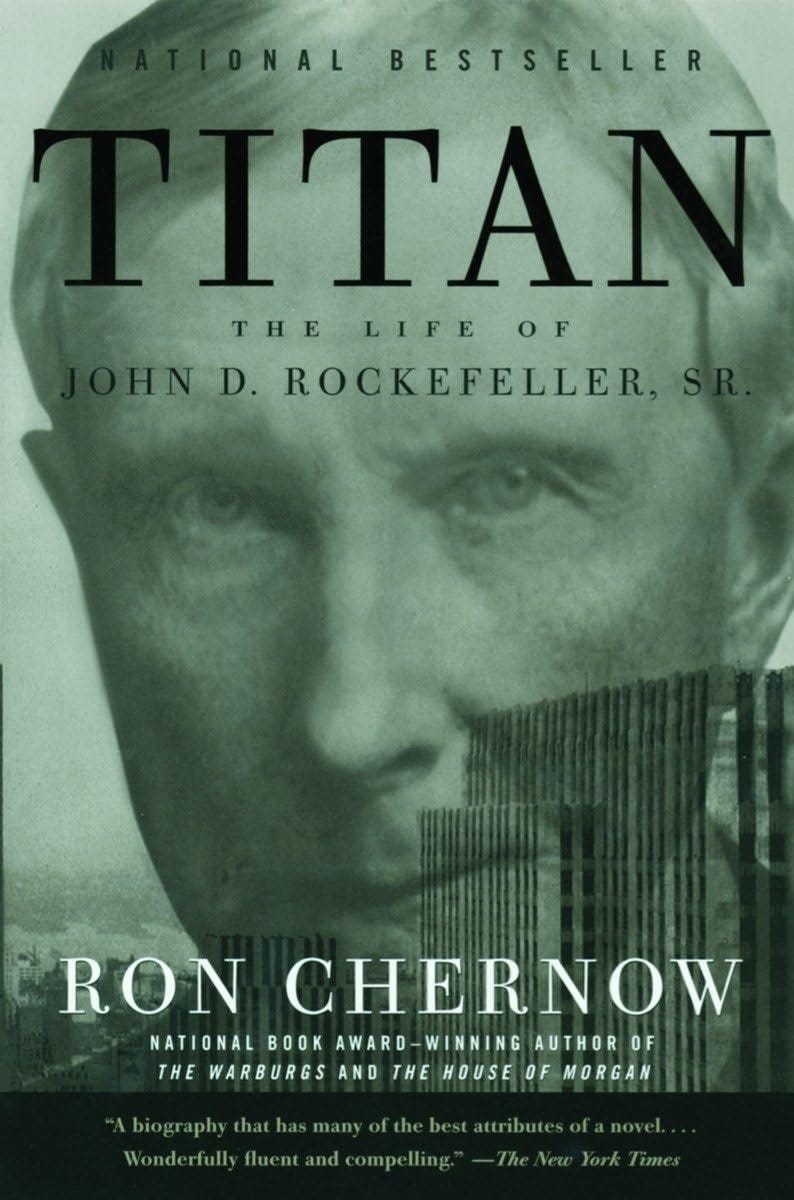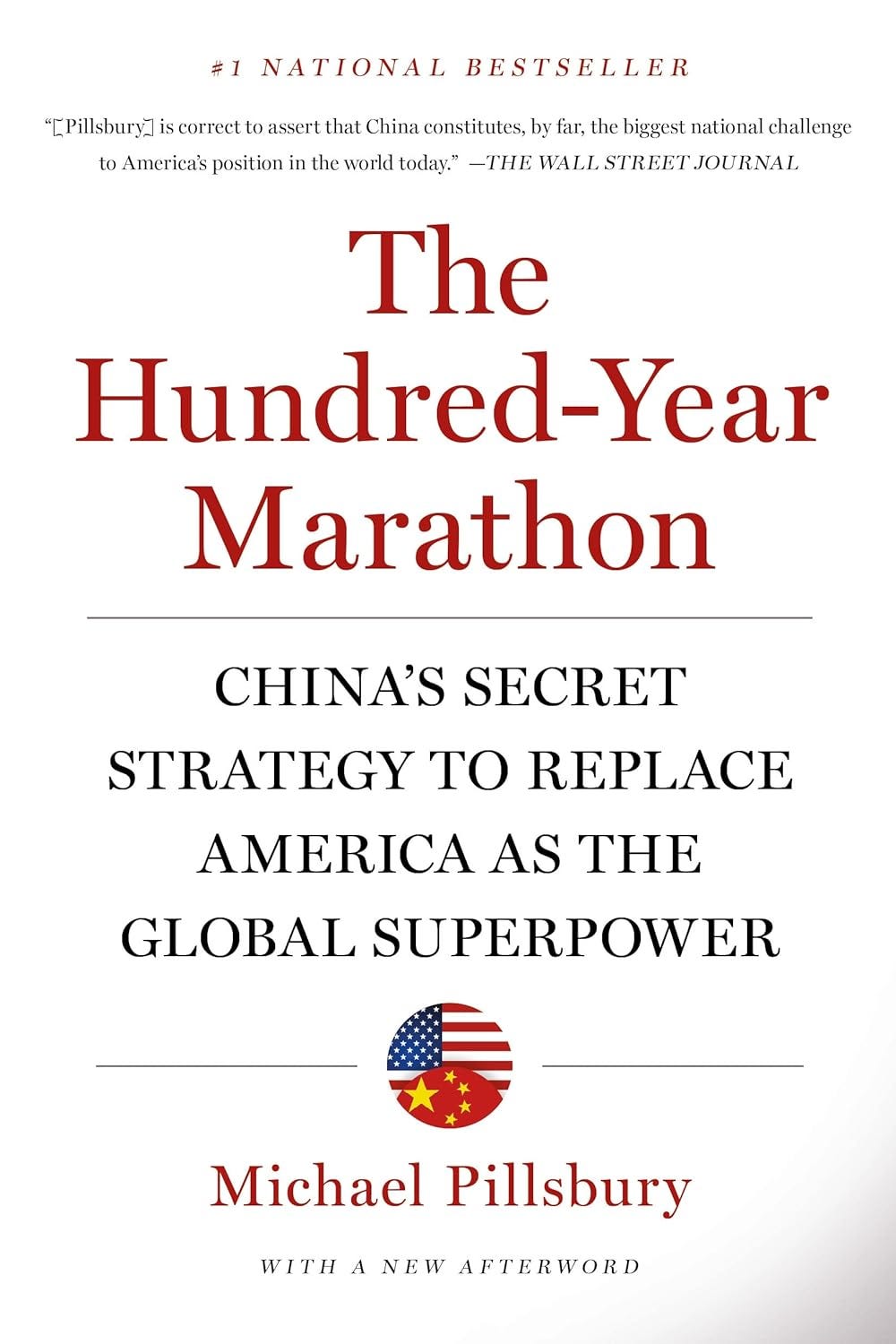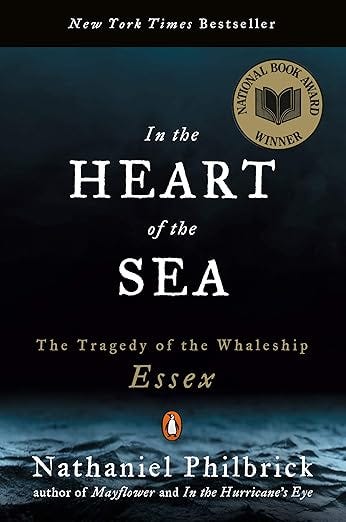This month we read:
Soft Currency Economics II by Warren Mosler
Titan: The Life Of John D. Rockefeller, Sr. by Ron Chernow
The Hundred-Year Marathon by Michael Pillsbury
In the Heart of the Sea: The Tragedy of the Whaleship Essex by Nathaniel Philbrick
The Happiest Man on Earth by Eddie Jaku
Soft Currency Economics II by Warren Mosler
Warren Mosler is the intellectual godfather of of Modern Monetary Theory (MMT). His interview on Bloomberg’s Odd Lots podcast piqued my interest when he said that the US is “spending like a drunken sailor.” His concern with the deficit was at odds with my prior understanding of MMT, so I decided to read his book (published in 2012).
Mosler thinks that our large deficit and large debt relative to GDP paired with he Fed’s hawkish policies will lead to an inflationary spiral.
Why? Mosler thinks higher interest rates are inflationary. He thinks the people receiving interest payments have a high propensity to spend them. This propensity to spend more than offsets the decline in investment due to high rates. If investment declines, demand goes up. When spending increases faster than the availability of goods and services, inflation kicks in.
When the public debt is small relative to the economy, this isn’t a big deal. When debt is 123% of GDP like it is now, interest payments turn into a huge stimulus.
This makes sense to me, but only if Mosler is right about the propensity to spend. I am not so sure he’s right about that. Some people will undoubtedly reinvest their interest payments into capital projects that expand production to meet the new demand. Figuring out the exact propensity to spend if difficult, if not impossible and I am glad I’m not a macroeconomic forecaster!
Mosler wants the Treasury to manage inflation by increasing or decreasing taxes. If inflation is high taxes can be raised to reduce aggregate demand and bring it in line with aggregate supply.
Mosler believes that bank demand for reserves are inelastic. No bank, he argues, has ever turned down a good loan because it didn’t have enough reserves. If a bank doesn’t have reserves, it borrows them. Therefore, he reasons that the Fed cannot affect the quantity of reserves in the banking system, only their price.
There’s a lot more in the book and frankly most of it went over my head. Read it at your own risk.
Matt
Titan: The Life Of John D. Rockefeller, Sr. by Ron Chernow
John D. Rockefeller was the architect behind the original “trusts” of which anti-trust law was formed. From the time oil was discovered in Pennsylvania around 1860 Rockefeller quickly came to dominate the oil market in the U.S. and around the world through a web of trust arrangements known as the Standard Oil Company.
While many of the tactics he used to muscle his way to the top of the industry are not allowed nowadays due to fair competition laws, elements of his competitive advantages are still present in many high quality businesses today. Fair or unfair as it may have been, it’s highly instructive to read about the making of one of the worlds strongest moats.
From a standing start in the backwaters of Cleveland, Ohio, and with a far from favored upbringing, Rockefeller masterfully consolidated the nascent oil market by forging arrangements with railroad companies that gave his refineries a distinct cost advantage. He guaranteed volumes to the railroads who in turn gave him shipping rates far below market. The lower shipping costs allowed him to undercut other refineries to unprofitable levels, at which time he would swoop in to “rescue” the competitors and bring new volume in-house, further strengthening his competitive advantage. It was the ultimate scale economies and distribution channel advantage.
Rockefeller went on to monopolize pipeline networks, enact predatory pricing after competition was eliminated, and launch aggressive industrial espionage attacks aimed at anyone who tried to slow him down. The result was an almost 90 percent market share in kerosene in the U.S. by 1905.
While all of these tactics are outlawed nowadays, you can still find elements each of these monopolistic tactics in the best businesses around the world today. As Peter Thiel reminds use, there are two types of businesses, monopolies, and non-monopolies, and I like to look through the lens of Standard Oil to try to find competitive advantages that rhyme with the ruthless behemoth that Rockefeller created 150 years ago.
From entrenched customer/supplier relationships, to scale advantages galore, to irreplaceable assets and insurmountable distribution advantages, the book is a 700 page tour de force on how to effectively compete in business. The book is also a fascinating look at not just his business endeavors but his philanthropic work and personal life that I view as almost required reading for anyone interested in business.
Dan
The Hundred-Year Marathon by Michael Pillsbury
The Hundred-Year Marathon was written by Michael Pillsbury who has spent decades as one of the United States top foreign policy strategists on U.S. - China relations. He wrote this book in 2015 in an attempt to debunk and highlight the myriad misconceptions that exist about China. The misunderstandings and resulting missteps have gone all the way up to every top government officials, presidents included, for the last several decades.
The cultural differences between the U.S. and China are obvious, but Pillsbury really hammers home some of the important differences in how we view the world vs. how some of China’s top party officials view the world.
Pillsbury takes us back to the time of Sun Tzu and and the Warring States period (475 - 221 BC) to understand the long-term cultural drivers of China’s strategy. He is of the opinion, based on conversations with various well-connected sources and decades of spending time in China, that China is in the midst of what he refers to as a 100-Year Marathon to regain global supremacy. Chinese leaders during the Warring States period relied on deception, false alliances, and extreme patience in order to rise to the top of the geopolitical realm, and he believes the same methods are clearly being employed today.
Whether or not Pillsbury is accurate in his assessment of China’s underlying motives and the likely ramifications over the next several decades, there are a number of business lessons to be gleaned from the ideas in the book. Things like never letting a competitor know you’re competing until it’s too late for them to fight back, take full advantages of well known human cognitive biases, and always default to extreme patience when setting your long-term plans, are all valuable takeaways for investors and business operators alike.
I found the book humbling and illuminating and it serves as a great reminder for investors that you should really have a firm grasp of other countries inner workings and culture before wading into making investments abroad.
Dan
In the Heart of the Sea: The Tragedy of the Whaleship Essex by Nathaniel Philbrick
This is the true story that inspired Herman Melville’s classic Moby Dick. It is a tale of survival, leadership, and tragedy. If you like adventure and survival stories (such as Endurance: Shackleton's Incredible Voyage or The Wager), you’ll like this. Be forewarned though, it is dark.
I couldn’t help comparing this book to The Wager, which I read in March. Both involve a shipwreck and survival months on end. In The Wager the survivors are part of the military and marooned on land. Military order quickly breaks down, rival factions emerge, and violence ensures.
That didn’t happen on the Essex. The sailors on the Essex were whalers, not part of the Navy, and yet they never became disorderly. That likely speaks to their leadership. Captain Pollard of the Essex was a push-over, but his first mate, Owen Chase, was capable and bold. The two evened each other out and, while the had disagreements, it never became disorderly. Shackleton, captain of the Endurance and perhaps one of the greatest leaders of all time, was able to maintain order as well through his charisma, cunning, and ability.
When the Essex sunk in the middle of the Pacific, Pollard wanted to sail west for Tahiti. Tahiti was closer than Chile, and, crucially, with the direction of the trade winds. The captain was convinced by his subordinates to instead sail against the wind directly for Chile. After several months at sea the Essex survivors had barely made any easterly progress against the wind and surely would have made it to Tahiti by then.
Such a long voyage through a dead zone in the Pacific, where plankton, the bedrock of the food chain, are scarce, led the men to “drawing lots” to see who would be shot, sacrificed so that the others might live. Like I said, this book is dark, much darker than The Wager and Endurance.
The sailors of the Essex were from Nantucket, which was a whaling boom town in the late 1700s and early 1800s. When kerosene destroyed demand for whale oil the whalers left, sailing to California to take part in the gold rush. Nantucket became a virtual ghost town until tourism revived it relatively recently. It is a cycle of boom and bust as old as time.
Matt
The Happiest Man on Earth by Eddie Jaku
The next time you’re upset about your stock portfolio doing down a few percent I’d suggest picking up Eddie Jaku’s autobiography. I won’t try too hard to spin this into a book with business lessons as The Happiest Man on Earth is a first hand account of the atrocities of the Holocaust.
If nothing else, books like this help keep things in perspective and if Jaku can make it through what he did, almost any day will seem like a walk in the park. His positive attitude, willingness to help strangers, and mental fortitude are all things that we can learn from. Anyone with ten percent of the mental toughness that Jaku possesses would surely make an outstanding investor.
Dan
The Best Of The Rest
WSJ: These Stock Picks Were No Ticket to Paradise. “A long-term study by Hendrik Bessembinder shows that half of all excess returns for American stocks over risk-free Treasury securities were created by just 83 companies from 1926 to 2019.“
Memo from Howard Marks: Mr. Market Miscalculates: Mood swings do a lot to alter investors’ perception of events, causing prices to fluctuate madly. When prices collapse as they did at the start of this month, it’s not because conditions have suddenly become bad. Rather, they become perceived as bad.”
Kingswell: Piecing Together Berkshire Hathaway's 1988 Annual Shareholders Meeting.
Liberty’s Highlights on Pfizer. “Pfizer’s 10 and 20-year stock CAGR is around 4%, and it has been underperforming the S&P500 over decades. This company is known for Xanax, Zoloft, Lipitor, Viagra, Advil, and COVID19 mRNA vaccines — many blockbusters and household names generating billions! Yet they couldn’t outperform… Long-term success in the stock market is *hard*.”
WSJ: A Moderate’s Advice to Harris on Energy. “How quickly consumers shift to renewable energy and electric vehicles depends on their cost, which is mostly a function of manufacturing and innovation. Federal policies matter at the margin but are constrained by how deeply fossil fuels remain entwined in the economy.”
WSJ: The New Math of Driving Your Car Till the Wheels Fall Off. Sky high new car prices encourage drivers to sink more into repairing their high mileage cars. That’s good for AutoZone and O’Reilly.
Invariant: Nicotine Pouches: The US Front. “The most helpful reference is Sweden, as total nicotine consumption in the country is similar to most of Europe but has shifted dramatically to oral products. So, while the country has a high total nicotine usage prevalence, the shift away from combustible products and toward lower-risk snus has resulted in a significant reduction in lung cancer and heart disease.”
Barron’s: Mind The Gap. A Morningstar Study compared time-weighted returns versus dollar-weighted returns at index funds. Dollar-weighted returns underperformed by 0.2% at mutual funds and 1.1% at ETFs. A product designed to be traded will be.
WSJ: Why Natural Gas Will Stay Under Pressure. “Absent a cold winter, the next boost to natural-gas demand likely won’t come until 2026, when meaningful LNG export capacity is expected to be added. Project delays have moved back the start date for some major projects, including Exxon Mobil and Qatar LNG’s Golden Pass. Further out in the future, prices could also rise if the bullish forecasts for electricity demand from data centers supporting artificial intelligence materialize.”
Do you have a “stranded” 401k from a past job that is neglected and unmanaged? These accounts are often an excellent fit for Eagle Point Capital’s long-term investment approach. Eagle Point manages separately manage accounts for retail investors. If you would like to invest with Eagle Point Capital or connect with us, please email info@eaglepointcap.com.
Disclosure: The author, Eagle Point Capital, or their affiliates may own the securities discussed. This blog is for informational purposes only. Nothing should be construed as investment advice. Please read our Terms and Conditions for further details.










I listened to that Mosler interview also, and enjoyed it. I will look for his book. On the subject of Auschwitz, if you haven't read The Escape Artist, I highly recommend it.